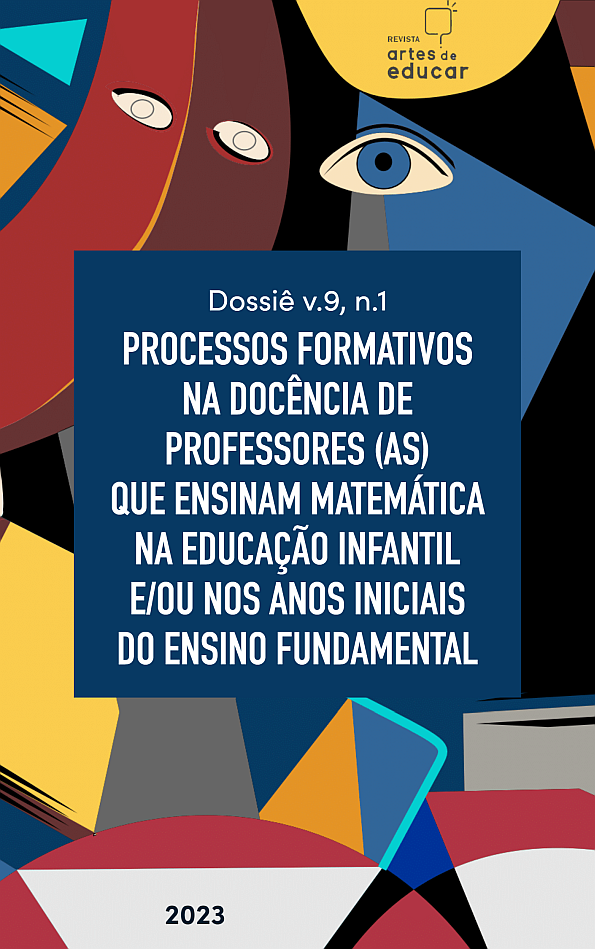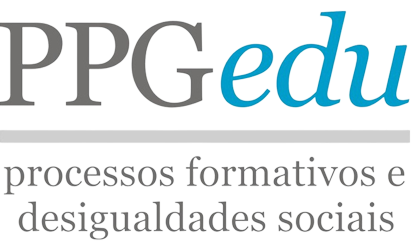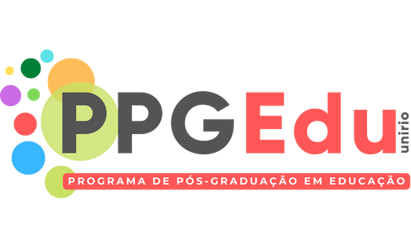TEACHING ALGEBRA IN THE EARLY YEARS: THE ANALYSIS OF CONTINUING EDUCATION FROM THE VIEW OF TEACHERS
DOI:
https://doi.org/10.12957/riae.2023.70857Keywords:
Continuing training. Early Algebra. Elementary School.Abstract
The aim of this study is to analyze the implications that a hybrid continuing education, focused on Early Algebra, has brought to the course-teachers of this formation. This in-service training was carried out with a group of eight teachers from the Initial Years of Elementary School, whose mathematical object refers to the development of algebraic reasoning, called Early Algebra. As for the analysis, it is a qualitative approach, having as theoretical support the studies carried out within the scope of Early Algebra. The results indicate that the training process enabled the teachers to appropriate and expand Early Algebra; allowed qualitative advances in the conceptual and didactic perspective by sharing experiences, discussing and reflecting on their own practices, contributing to the development of their algebraic reasoning, and consequently, of their students.References
ALVARADO-PRADA, L. E.; FREITAS, T. C.; FREITAS, C. A. Formação continuada de professores: alguns conceitos, interesses, necessidades e propostas. Revista Diálogo Educacional. Curitiba, v. 10, n. 30, p. 367-387, maio-ago. 2010.
ALVES-MAZZOTTI, A. J. O método nas Ciências Sociais. In: ALVES-MAZZOTTI, A. J.; GEWANDSZNAJDER, F. O método nas Ciências Naturais e Sociais: Pesquisa Quantitativa e Qualitativa. 2. ed. São Paulo: Editora Pioneira, 2001. Parte I, p. 107-188.
BECK, V. C.; SILVA, J. A. da. Invariantes Operatórios de Equilíbrio Algébrico Presentes nas Estratégias de Estudantes do 3º Ano do Ensino Fundamental. Bolema (Rio Claro), v. 33, p. 1424-1443, 2019.
BERNSTEIN, B. Pedagogía, control simbólico e identidad: teorias, investigacíon y crítica. Por Basil Bernstein; traduccuión de Pablo Manzano; revisión de Basil Bernstein, Juia Varela. São Paulo: Cortez; Madrid, España: Ediciones Morata, 2017.
BILLINGS, E. Exploring generalization through pictorial growth patterns. In: C.
Greenes & R. Rubenstein (Eds.), Algebra and algebraic thinking in school
mathematics (pp. 279-293). Reston, VA: NCTM, 2008.
BITENCOURT, D. V. Early álgebra na perspectiva do livro didático. 2018. 126 f. Dissertação de Mestrado em Educação Matemática, Universidade Estadual de Santa Cruz. Ilhéus/BA.
BLANTON et al. Developing Essential Understanding of Algebraic Thinking for Teaching Mathematics in Grades 3–5. Essential Understanding Series. Reston, VA: NCTM, 2011.
BLANTON, M. Algebra and the elementary classroom. Portsmouth, NA: Heinemann, 2008.
BLANTON, M. et al. Early Algebra. In: VICTOR, J. K. (Ed.) Algebra: Gateway to a Technological Future. Columbia/USA: The Mathematical Association of America, 2007.
BLANTON, M.; KAPUT, J. Functional thinking as a route into algebra in the elementar grades. In: J. Cai & E. Knuth (Eds.), Early algebraization (pp. 5-23). Berlin: Springer, 2011.
BLANTON, M.; KAPUT, J. Characterizing a classroom practice that promotes algebraic reasoning. Journal for Research in Mathematics Education, V. 36, Nº 5, p. 412–446, 2005.
BLANTON, M.; STEPHENS, A.; KNUTH, E.; GARDINER, A. M.; ISLER, I.; KIM, J.-S. The development of children's algebraic thinking: the impact of a comprehensive early algebra intervention in third grade. Journal for Research in Mathematics Education, v. 46, n.1, p. 39-87, 2015.
BRASIL. Elementos Conceituais e Metodológicos para os Direitos de Aprendizagem e Desenvolvimento do Ciclo de Alfabetização (1º, 2º e 3º anos) do Ensino Fundamental. Ministério da Educação, Secretária de Educação Básica, Brasília, 2012.
BRASIL. Ministério da Educação. Base Nacional Comum Curricular. Brasília: MEC/SEF, 2018. Disponível em: <http://basenacionalcomum.mec.gov.br/imagens/BNCCpublicacao.pdf>. Acesso em: 14 de mar. de 2019.
BRASIL. Ministério da Educação. Conselho Nacional de Educação. Diretrizes Curriculares Nacionais para a formação inicial em nível superior e para a formação continuada. Resolução CNE Nº 2/2015.
BRASIL. Secretaria de Educação Fundamental. Parâmetros Curriculares Nacionais: Matemática. Brasília: MEC/SEF, 1998.
_____. Ministério de Educação. Lei nº 10.172/2001. Plano Nacional da Educação. Brasília: MEC, 2001.
_____. Ministério de Educação. Lei nº 9394/96. Lei de Diretrizes e Bases da Educação Nacional. Brasília: MEC, 1996.
CANAVARRO, A. P. O pensamento algébrico na aprendizagem da Matemática nos primeiros anos. Quadrante, v. XVI, n. 2, p. 81-118, 2007.
CARRAHER, D. W.; SCHLIEMANN, A. D. Early Algebra Teaching and Learning. In: LERMAN, Steve (Ed.) Encyclopedia of Mathematics Education. London: Springer, p. 193-96, 2014.
CARRAHER, D. W.; SCHLIEMANN, A. D. O lugar da álgebra no Ensino Fundamental. In: MARTINS, E.; LAUTERT, S. (ORG) Diálogos sobre o ensino, aprendizagem e a formação de professores: Contribuições da Psicologia da Educação Matemática. Editora Autografia: Rio de Janeiro, 2016.
COSTA, N. M. L. A formação contínua de professores – Novas tendências e novos caminhos. Holos. Ano 20, v.03, p.63-75, dezembro de 2004.
KATZ, V. J. Algebra: Gateway to a TechnologicalFuture. Columbia: MAA Reports, 2007.
KIERAN, C. et al. Early Algebra: Research into its Nature, its Learning, its Teaching. Hamburg: ICME, 2016.
LORENZATO, S. (Org.). Aprender e ensinar geometria. Campinas: Mercado das Letras, 2015. (Série Educação Matemática).
LUZ, C. S.; SANTOS, M. O.. Formação continuada: uma reflexão a partir dos saberes necessários á prática pedagógica. Revista Educação CEAP, ano11, n° 43, Salvador, p.67-77, dez/2003 – Fev/2004.
MAGINA, S. M. P.; SANTANA, E. R. dos S.; SANTOS, A. dos; MERLINI, V. L. Espiral RePARe: um modelo metodológico de formação de professor centrado na sala de aula. REAMEC - Rede Amazônica de Educação em Ciências e Matemática, [S. l.], v. 6, n. 2, p. 238-258, 2018. Disponível em: https://periodicoscientificos.ufmt.br/ojs/index.php/reamec/article/view/6812. Acesso em: 10 set. 2022.
NACARATO, A. M. (Org.). Cultura, formação e desenvolvimento profissional de professores que ensinam matemática. São Paulo: Musa Editora, 2005.
NACARATO, A. M. A Formação do Professor de Matemática: pesquisa x políticas públicas. Revista Contexto e Educação – Programa de Pós-Graduação em Educação nas Ciências (PPGEC)– Unijuí/, Ano 21, n. 75, Jan/Jun. 2006.
NÓVOA, A. Formação de professores e profissão docente. In: (Org.) Os professores e a sua formação. Lisboa: Dom Quixote, 1992.
OLIVEIRA, C. F. S. Formação Continuada de Professores e a Early Algebra: uma intervenção híbrida. 2018. 225 f. Dissertação (Mestrado em Educação Matemática), Universidade Estadual de Santa Cruz. Ilhéus/BA, 2018.
PORTO, R. S. O. Early álgebra: prelúdio da álgebra por estudantes do 3° e 5º anos do ensino fundamental. 2018. 177f. Dissertação (Mestrado em Educação Matemática) – Universidade Estadual de Santa Cruz, Ilhéus, 2018.
SILVA, J. A.; FREITAS, F. M.; LEITE, M. C. L.. Diretrizes invisíveis e regras distributivas nas políticas curriculares da nova BNCC. CURRÍCULO SEM FRONTEIRAS, v. 18, p. 857-870, 2018.
TARDIF, M. Princípios para guiar a aplicação dos programas de formação inicial para o ensino. In: BONIN, Iara; EGGERT, Edla; PERES, Eliane & TRAVERSINI, Clarice (Orgs.). Trajetórias e processos de ensinar e aprender: didática e formação de professores. Porto Alegre: EDIPUCRS, 2008. p. 17-46.
Published
How to Cite
Issue
Section
License
Copyright (c) 2023 Revista Interinstitucional Artes de Educar

This work is licensed under a Creative Commons Attribution-NonCommercial 4.0 International License.
Authors retain copyright to their work, are permitted to publish and distribute their work online (e.g., in institutional repositories or on their personal page) at any point before or during the editorial process, as this may generate productive changes, as well as increasing the impact and citation of published work.
The acceptance of the text implies the authorization and exclusivity of the Revista Interinstitucional Artes de Educar regarding the right of first publication, the published works are simultaneously licensed with a Creative Commons Attribution-Non Commercial 4.0 International License 























